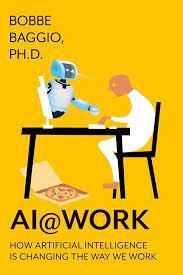
단행본
(The) future of work: robots, AI, and automation
- 청구기호
- 331.12 FUT2018
- 발행사항
- Washington, D.C. : Brookings Institution Press, 2018
- 형태사항
- 205 p
- 서지주기
- Includes bibliographical references and index
- ISBN
- 9780815732938
- 분류기호
- 듀이십진분류법->331.12
소장정보
| 위치 | 등록번호 | 청구기호 / 출력 | 상태 | 반납예정일 |
|---|---|---|---|---|
이용 가능 (1) | ||||
| 한국노동연구원 | 00009225 | 대출가능 | - | |
지금 이용 불가 (1) | ||||
| 한국노동연구원 | 00008718 | 대출중 | 2024.07.02 | |
이용 가능 (1)
- 등록번호
- 00009225
- 상태/반납예정일
- 대출가능
- -
- 위치/청구기호(출력)
- 한국노동연구원
지금 이용 불가 (1)
- 등록번호
- 00008718
- 상태/반납예정일
- 대출중
- 2024.07.02
- 위치/청구기호(출력)
- 한국노동연구원
책 소개
Robots, artificial intelligence, and driverless cars are no longer things of the distant future. They are with us today and will become increasingly common in coming years, along with virtual reality and digital personal assistants.
As these tools advance deeper into everyday use, they raise the question―how will they transform society, the economy, and politics? If companies need fewer workers due to automation and robotics, what happens to those who once held those jobs and don't have the skills for new jobs? And since many social benefits are delivered through jobs, how are people outside the workforce for a lengthy period of time going to earn a living and get health care and social benefits?
Looking past today's headlines, political scientist and cultural observer Darrell M. West argues that society needs to rethink the concept of jobs, reconfigure the social contract, move toward a system of lifetime learning, and develop a new kind of politics that can deal with economic dislocations. With the U.S. governance system in shambles because of political polarization and hyper-partisanship, dealing creatively with the transition to a fully digital economy will vex political leaders and complicate the adoption of remedies that could ease the transition pain. It is imperative that we make major adjustments in how we think about work and the social contract in order to prevent society from spiraling out of control.
This book presents a number of proposals to help people deal with the transition from an industrial to a digital economy. We must broaden the concept of employment to include volunteering and parenting and pay greater attention to the opportunities for leisure time. New forms of identity will be possible when the "job" no longer defines people's sense of personal meaning, and they engage in a broader range of activities. Workers will need help throughout their lifetimes to acquire new skills and develop new job capabilities. Political reforms will be necessary to reduce polarization and restore civility so there can be open and healthy debate about where responsibility lies for economic well-being.
This book is an important contribution to a discussion about tomorrow―one that needs to take place today.
목차
Preface ix
PART I: Accelerating innovation
One: Robots 3
Two: Artificial intelligence 19
Three: The internet of things 43
PART II: Economic and social impact
Four: Rethinking work 63
Five: A new Social Contract 89
Six: Lifetime learning 109
PART III: An action plan
Seven: Is politics up to the task? 127
Eight: Economic and political reform 149
Notes 167
Index 195







